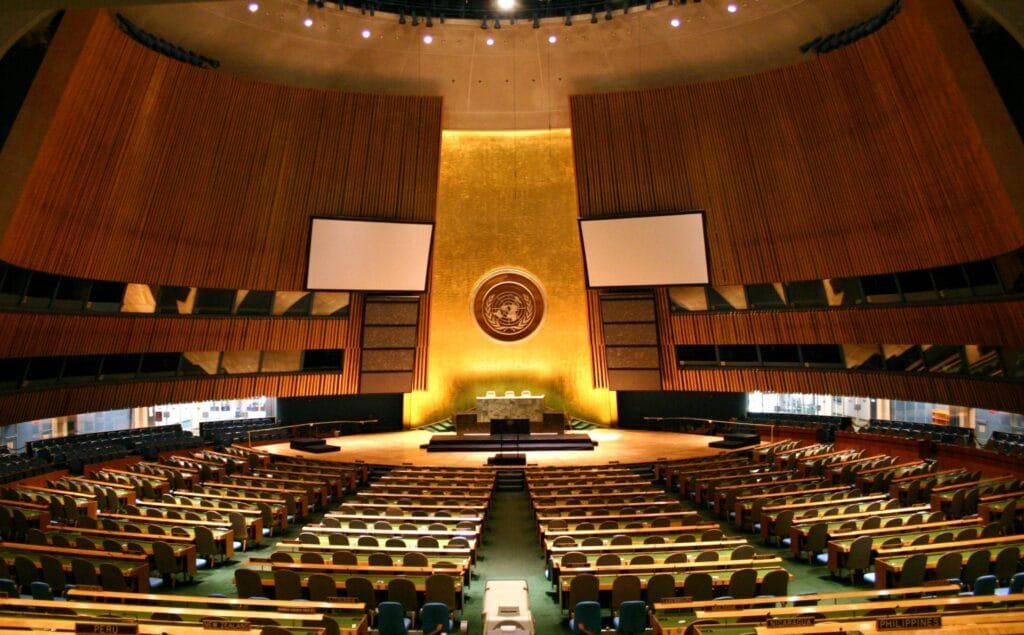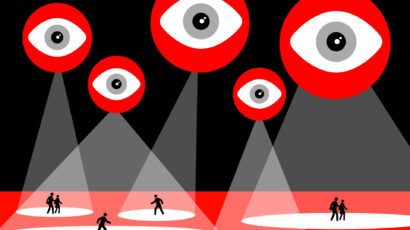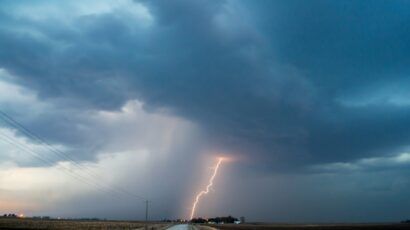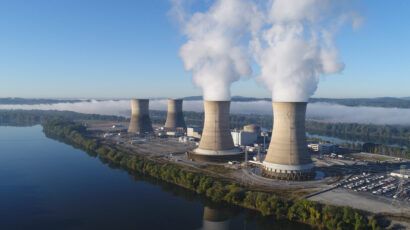UN to conduct new study of the broad impacts of nuclear war. Not all countries want to know
By François Diaz-Maurin | November 5, 2024
 United Nations General Assembly hall at the UN Headquarters, New York City (Image Patrick Gruban, CC BY-SA 2.0)
United Nations General Assembly hall at the UN Headquarters, New York City (Image Patrick Gruban, CC BY-SA 2.0)
The UN General Assembly voted overwhelmingly last week in favor of launching a two-year study on the effects of nuclear war—the first such expert study the UN has pursued since the 1980s. A total of 144 UN member states, including only one nuclear power, China, voted in favor. Some important NATO members also voted in favor of the resolution, including Germany, Italy, the Netherlands, Norway, and Greece. Russia, France, and the United Kingdom voted against the resolution, while other nuclear states, including the United States, abstained.
The resolution “Nuclear War Effects and Scientific Research,” sponsored by Ireland and New Zealand and co-sponsored by 30 countries, was submitted in mid-October at the UN General Assembly’s First Committee on Disarmament and International Security. The effort includes establishing an independent panel of scientific experts tasked with reviewing and commissioning relevant studies and publishing a comprehensive report that includes future research needs relating to the impacts of nuclear war.
Not every country sees a need for a new study.
The United Kingdom, France, and Russia did not provide official statements explaining their votes against the resolution at the United Nations. “Nuclear war would have devastating consequences for humanity. We don’t need an independent scientific panel to tell us that,” a UK Foreign Office spokesperson told The Guardian, adding, “The UK remains fully committed to its obligations under the nuclear non-proliferation treaty (NPT). The resolution does not advance this cause.” (Article 6 of the NPT includes disarmament-related obligations of the five nuclear weapons states, as well as all non-nuclear weapons states.)
Zia Mian, a physicist at Princeton University and one of the most active proponents of the UN resolution, disagrees. “There was a UN study on nuclear war in the 1960s, another one in the 1970s, and then one in the 1980s, and nothing since,” Mian told the Bulletin. This happened “despite decades of scientific work on these issues and the great changes that have taken place in nuclear arsenals, global society, and economy,” he recently explained in an article for First Committee Monitor, an independent outlet providing analyses on the UN General Assembly First Committee on Disarmament and International Security.
In 1985, the General Assembly adopted a resolution in which it requested the Secretary-General to carry out a study on the climatic and potential physical effects of nuclear war, including nuclear winter. The study, published in 1988, confirmed that nuclear winter and other climatic effects of nuclear war pose an extreme danger to all countries, even those far from the nuclear explosions.
The new UN study will examine “the physical effects and societal consequences of a nuclear war on a local, regional and planetary scale, including, inter alia, the climatic, environmental and radiological effects, and their impacts on public health, global socioeconomic systems, agriculture and ecosystems, in the days, weeks and decades following a nuclear war.” For Alan Robock, a climatologist at Rutgers University and a leading scientist in the study of the impacts of nuclear war who helped develop the science of nuclear winter since the 1980s, “this will be the most comprehensive study ever on this subject.”
In a 2023 study, the US National Academies of Science, Engineering, and Medicine concluded that there is a significant knowledge gap about the effects of nuclear war among the US military and policymakers. The study found that because the Defense Department’s nuclear war consequence models, which define the US strategic thinking on nuclear war, focus on “prompt effects and military objectives,” they result in “a partial accounting of the consequences leading to a limited understanding of the breadth of the outcomes.” The National Academies committee concluded: “There is a need to improve the understanding of less-well-understood physical effects of nuclear weapons (such as fires; damage in modern urban environments; electromagnetic pulse effects; and climatic effects, such as nuclear winter), as well as the assessment and estimation of psychological, societal, and political consequences of nuclear weapons use.”
“It is hard to imagine a longer list of shortcomings in understanding the effects of using nuclear weapons,” Mian wrote in a recent article for Scientific American.
The National Academies is currently working on a similar study of the potential environmental effects and socio-economic consequences that could unfold in the weeks to decades following nuclear wars. But Mian and Robock aren’t convinced that the National Academies study is sufficient. “It’s a more limited study [than the newly-mandated UN study],” Robock told the Bulletin. “The [National Academies’] study mandate is to assess only nuclear winter-related effects, and it excludes radioactive fallout and other effects,” Mian further explains.
They also wonder why the study, which was mandated by Congress in 2020 and had its last meeting in May, has still not published its consensus report yet. “It has been going on for years and is currently way overdue,” Robock said.
Robock worries the National Academies’ effort may be used by some to discredit decades of research on the long-term impacts of nuclear war, referring to “several members from the US nuclear establishment, who have testified to the committee that the environmental effects have been overblown and should be ignored.”
During the second committee meeting on May 23-24, 2023, Christopher Yeaw, the associate executive director of the National Strategic Research Institute, a research center sponsored by US Strategic Command, testified:
“For nuclear deterrence, I would say that we wouldn’t want to give the impression to adversaries like Russia and China that we have so much concern over environmental prospects of nuclear weapons deployment that we are self-deterred. So we want to be careful not to come near to that line. If they feel that we are self-deterred, because we don’t want to engage in any nuclear deployment ever, regardless of their nuclear deployment because of environmental effects, then deterrence, I think, would be undermined at that point. And so there’s a little bit of caution there.”
To Robock, this testimony equals to saying that if the US nuclear establishment “acknowledged the horrific impacts of nuclear war, their theory of deterrence would fail, so that it is in their interest to pretend that they can actually use nuclear weapons to threaten enemies in spite of the damage it would do to our country and the rest of the world.” In other words, a study that closely examines the long-term effects of nuclear war may not be welcome by those countries relying on nuclear deterrence for their strategic posture.
China, however, saw the situation differently by being the only nuclear-armed state to vote in favor of the UN resolution last week. “China achieved its objective of presenting itself as a more responsible nuclear power compared to others, which may alleviate some international pressure on it to explain its nuclear expansion and join arms control talks,” Tong Zhao, a senior fellow at the Carnegie Endowment for International Peace and an expert on China’s nuclear doctrine, said, adding, “While unlikely to prompt immediate changes in China’s nuclear or arms control policy, the resolution could have a positive impact over the long term.”
China is expected to send an expert to the UN scientific panel on the effects of nuclear war. “This science-based, expert-led process may provide a counterbalance to the increasingly secretive and military-dominated nature of China’s internal nuclear policy deliberation,” Zhao told the Bulletin.
Mian hopes an independent UN study will also offer a counterbalance in the US nuclear policy debate. “This new study could lead to a more fully informed and inclusive 21st-century global debate on how much and how little everyone—including the nuclear-armed states themselves—actually knows of the catastrophic large-scale, long-term human, environmental, ecological, economic, and societal impacts of using nuclear weapons,” he said.
Robock sees the upcoming UN study as a strategic effort toward the complete elimination of nuclear weapons worldwide. “The UN report will be important to inform the world of the potential catastrophic impacts of a nuclear war, which could kill most of the people on the planet due to famine from the environmental impacts on agriculture,” he explains. “This report will speed up the adoption of [the UN Treaty on the Prohibition of Nuclear Weapons] by the nations that have still not signed and ratified it.”
No country that possesses nuclear weapons has signed or ratified the nuclear ban treaty.
Ahead of the vote last week, former UN Secretary-General Ban Ki-moon called on all nations to support the resolution for a new UN study. “It is imperative that we update our knowledge on how nuclear conflict would devastate our environment, our economies, and our very existence.”
Together, we make the world safer.
The Bulletin elevates expert voices above the noise. But as an independent nonprofit organization, our operations depend on the support of readers like you. Help us continue to deliver quality journalism that holds leaders accountable. Your support of our work at any level is important. In return, we promise our coverage will be understandable, influential, vigilant, solution-oriented, and fair-minded. Together we can make a difference.
















If there truly were a civilization on this planet, this small blue orb, would there be nuclear weapons on it? No. What we have been witnessing is the collective insanity of humanity with TOTAL disregard for the natural world which is out life-support system. But, we have always pushed Nature out of our way. Nuclear weapons do give us the opportunity to also eliminate ourselves.